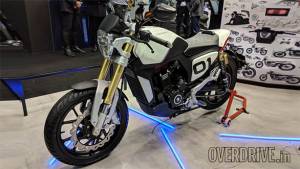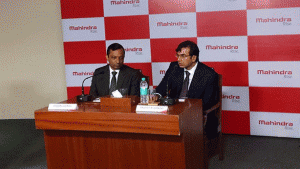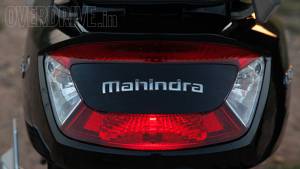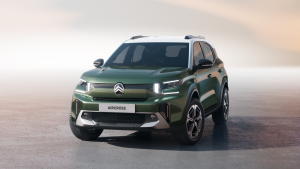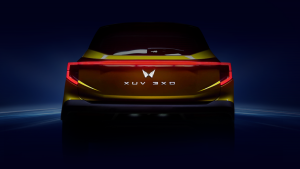Analysis: Why Mahindra wants Peugeot Scooters
When the 20th century dawned - that's the previous one, not the current one - Peugeot was already in the two-wheeler business. While popular in France, their two-wheeler business has never been globally huge and in the more recent past, along with the car business (under the PSA Group, Peugeot and Citroen branded cars) the business has not been doing well. New CEO Carlos Tavares was brought into to the PSA with the aim of effecting a turnaround. And his agenda seems to be that the two-wheeler business must go.
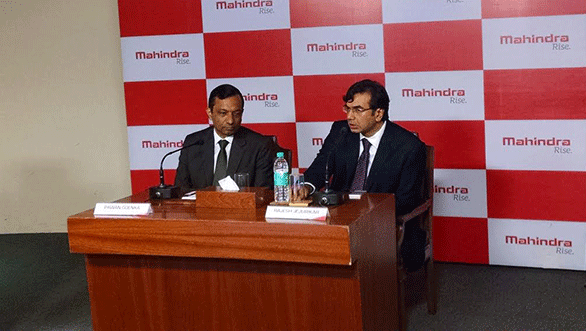 President, Mahindra Automotive and Farm Equipment Sectors, Pawan Goenka and chief executive, Farm Equipment and Two Wheeler Division, Rajesh Jejurikar at the press conference announcing the merger
President, Mahindra Automotive and Farm Equipment Sectors, Pawan Goenka and chief executive, Farm Equipment and Two Wheeler Division, Rajesh Jejurikar at the press conference announcing the merger
Enter Mahindra Two Wheelers and the rumours of a pending acquisition have materialised into an offer to purchase a controlling stake in the french outfit. A total of 28 million will be spent. I am not a financial expert but if it makes sense to you, "13 million will be spent on the secondary sale of shares from Peugeot of PSA, and 15 million through a fresh issue of shares to M&M." I am quoting, verbatim, from the news report in the Economic Times. Three months is what Mahindra expects before the deal goes through - I will explain this - and when complete, Mahindra will have three board members (from the two-wheeler business) and PSA Group will have two.
When the announcement happened, Mahindra's stock prices fell by two per cent - the market didn't like this news. They were like, why the hell are they investing in a bleeding red French scooter maker, then? So, is there more than meets the eye?
Merger/Acquisition basics
When you purchase a functioning business, what are you buying, really? The first thing you're buying, clearly, are all the physical assets. That's land, factories, machinery and so forth. The second thing, also clearly, is the current manpower. That's not just the people, but also their skills and abilities. But perhaps just as crucial, though intangible, is stuff like the value of the brand you have acquired. I believe Mahindra have got themselves a good deal on four fronts.
The Peugeot Motorcycle brand
What Mahindra Two Wheelers gains in the acquisition is a French (and therefore European) scooter brand. Is Peugeot seriously such a huge big brand? Compared to Vespa or Piaggio, it is not, to be sure. On the other hand, most people do know that Peugeot is French and in automobiles. In that sense, selling a scooter range in a land far, far away might be a little easier for Mahindra, who are a behemoth here, but a relative unknown in most countries.
At least that is the theory. I would have liked Mahindra to acquire perhaps a bigger brand for this theory to be founded on bedrock. That being said, if the brand were that kind of strong, then the price would be considerably higher too. Of the four things that Mahindra stands to gain, the strength of the brand, especially as a two-wheeler maker, is the weakest.
The French marque's technology
Seriously, a loss-making bike maker has technology we want? It is easy to be cynical but there are two perspectives here. First, let's look at what Mahindra are getting right now. Peugeot currently has electric scooters, three-wheeled scooters as well as a supercharged scooter in its current product range. By current product range, I mean that the technology is in product form and deployed in the market. In theory, Mahindra can rapidly roll out, for instance, a supercharged Gusto because it doesn't have to go through the full process of learning supercharging, developing prototypes and then validation and production. Many parts of the process can be skipped because Peugeot has already learnt how to productionise their supercharger.
You can scoff at this point. Will a three-wheeler scooter be relevant to India? Do we need supercharged scooters? Look at it like this. A completely regular, uncommentworthy scooter, say the Tweet or Vivacity, is still an European-style scooter. A premium product in nature and finish. Mahindra Two Wheelers will make their first premium class product in the Mojo shortly and in that sense, Peugeot Motorcycles' product line and premium nature should be extremely complementary.
Second perspective. Think about the people developing these products. Obviously, the current team is at best 40 years old or something, but organisations grow because what they learn transcends generations in the company and knowledge accumulates. In that sense, Peugeot Motorcycles has been developing two-wheelers for over a century. That's a lot of knowledge - something Mahindra Two Wheelers cannot put a price on. In contrast to Peugeot, they are a young company and if you count the Stallio, they've developed a sum total of three platforms so far (Stallio, Centuro and Mojo). Even if Mahindra Two Wheelers choose not to use any of Peugeot's technology directly, just having a team of engineers who know the ins and outs of the process will have tremendous value.
If I were asked to make the decision to acquire Peugeot Motorcycles, just access to their R&D, their R&D processes and knowledge and current technology portfolio might have persuaded me to go ahead and spend the money.
Peugeot goes to 50 countries
Mahindra has global ambitions. The Two Wheeler business is no exception. The biggest challenge in going global is to actually go global and reach the streets of faraway places. Now, Peugeot Motorcycles' website is super interesting. They have a section of key figures which claims many things. Among them is that Peugeot is present in 50 countries. This is 2011 data on the page and I don't know what's happened in the last three years. But odds are most of those countries still have Peugeot or at least remember Peugeots. Which should make Mahindra's job of entering and establishing a two-wheeler business immeasurably easier.
And think of the developing world that speaks French. Large parts of Africa are yet to experience a wide-spread personal mobility revolution and you can bet your bottom dollar that it will be scooters and motorcycles that'll ignite the fuse. Large parts of Africa also speak French as their primary language where having a French scooter brand could be a nice little edge to hack away at more established players with.
Don't also forget that Peugoet has a tie-up in place in China. China has proved to be a relatively India-proof market. Enough for most Indian manufacturers to mostly ignore such a huge market. Peugeot entered China in 2010 entering a 50-50 JV with Quingqi Motorcycles that ended up with a plant in Jinan that was to make 80-125cc scooters. Even if I discount the actual scooters themselves, having a Chinese presence means Mahindra Two Wheelers can now access many markets where China has trade agreements in place.
In this sense, the reach that Mahindra will acquire with Peugeot is a strategic asset. It can allow Mahindra to access a sea of new markets that would otherwise take a lot of time and effort to create arrangements and tie-ups in.
A full premium scooter line
The Indian scooter market is incredible. About a third of all two-wheelers sold today are already scooters and that's a massively huge number. Even more impressive is the resilience of scooter demand which continues to grow even in the face of recession, bad monsoon and every other reason investors and analysts think up to paint doom and gloom scenarios. But look at the products on sale here. Strip them of the branding and squint a little and you have a roiling ocean of template scooters all of which have 100-125cc engines and variomatics. Marketing geniuses turn them into feminine scooters, masculine scooter, family scooters. It's amazing that a market this large has not differentiated to offer alternatives to the basic scooter.
Honda, Yamaha and Suzuki, however, big players in the market already know how to offer scooter alternatives, in displacement as well as in role. Indian manufacturers like TVS and Mahindra will have to learn this art from scratch. But with Peugeot, Mahindra gets direct access to a premium range that it can deploy nearly at will if needed. Nearly because the European scooters will probably not meet Indian norms as is.
Is premium that critical? In volumes terms, perhaps not. But premium products make money, create an image and when they're great, they create loyal customers who stay in the family for a long time.
Why is Peugeot making losses?
It's easy to think that Peugeot must be making bad products for it to be loss-making. The reality is that Peugeot evolved into a very European, Europe-centric manufacturer. It put all its chicken in one basket. And then the recession dropped a three-tonne stone on the basket killing most of the chicken. As in, they were enjoying good business from Europe. And then the European scooter business collapsed. And Peugeot went into losses. On the other side, Piaggio, which had taken its brands, especially Vespa to other countries, managed to keep its head above the water, and then indeed, thrive because it was present in more places.
In that sense, Mahindra could effect the turnaround for Peugeot simply by making the French scooter brand go places. Like to India. We are a huge market and I believe that despite the epic sales growth, India still doesn't have a range of scooters on sale that reflects the size of the market.
Can Mahindra effect a turnaround, then?
I think they could. They already have shown that they can take ailing brands like Ssangyong and turn them around. Ssangyong products now show more maturity and sales have doubled. So yes, Mahindra have done this before and I personally see no reason why they couldn't do this to Peugeot Motorcycles.
Give me a supercharged Gusto, right now!
Well, that's going to take a while. The reason the deal is going to take three months is because there's a lot of work to be done before the 28 million turn into a real thing. Right now, it's paper. Now the governments have to clear the deal. Mahindra will have to deal with the unions and put new agreements into place. Then comes the question of future strategy, for Peugeot, for Mahindra Two Wheelers and for both as parts of one unit. After which comes the question of supercharging the Gusto.
It's not really that big a deal
So there are no negatives at all? Why, of course there are. The whole thing could be a house of cards which could blow up in Mahindra Two Wheelers' face. But I understand - no personal experience - that doing business means taking on risk in the hunt for reward and profit. No risk means no reward. In that sense, Mahindra Two Wheelers are enjoying another day at work, more or less. It's not that big a deal.
Then consider this. The Mahindra group as a whole was a US$16.5 billion juggernaut last year. And this deal, a whopping 28 million, is let's see, two per cent of that. Two per cent is not a big deal.
Starts Rs 1,02,700
149cc
5-Speed
12.40
13.60
-NA-
